

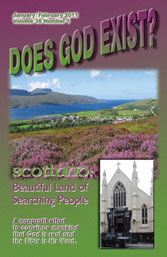 In July 2010, the Does God Exist? ministry spent three
weeks in Scotland doing forty-one presentations in nineteen days. The
presentations in Livingston were in a church building, but in Aberdeen
and Dundee the presentations were in neutral ground sites — a hotel
meeting room in Aberdeen and a gymnasium (a multipurpose room) in
Dundee.
In July 2010, the Does God Exist? ministry spent three
weeks in Scotland doing forty-one presentations in nineteen days. The
presentations in Livingston were in a church building, but in Aberdeen
and Dundee the presentations were in neutral ground sites — a hotel
meeting room in Aberdeen and a gymnasium (a multipurpose room) in
Dundee. Just traveling in Scotland was a joy. The country is
beautiful with a rugged coastline and mountains rising over 1,000 feet
in what is called “The Highlands.” With the Gulf Stream on one side and
the North Sea on the other, there are wild swings in weather
precipitating the comment from the locals that “we have all four
seasons every day.” Winters are mild, but wet. Summers are cool and
wet. All of this wetness produces green everywhere and beautiful
gardens abound throughout the country.
Just traveling in Scotland was a joy. The country is
beautiful with a rugged coastline and mountains rising over 1,000 feet
in what is called “The Highlands.” With the Gulf Stream on one side and
the North Sea on the other, there are wild swings in weather
precipitating the comment from the locals that “we have all four
seasons every day.” Winters are mild, but wet. Summers are cool and
wet. All of this wetness produces green everywhere and beautiful
gardens abound throughout the country.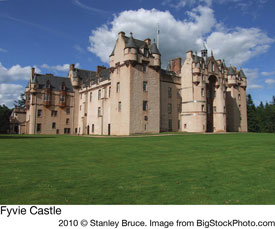 This picture shows the result of all this.
The “Dog House” was a
beautiful old church building across the street from the gymnasium
where we conducted our lectureship in Dundee. Like most church
buildings in Scotland, it now serves a secular purpose. Most church
buildings are nightclubs, like the Dog House, or bars, banks, museums,
bookstores,
This picture shows the result of all this.
The “Dog House” was a
beautiful old church building across the street from the gymnasium
where we conducted our lectureship in Dundee. Like most church
buildings in Scotland, it now serves a secular purpose. Most church
buildings are nightclubs, like the Dog House, or bars, banks, museums,
bookstores, 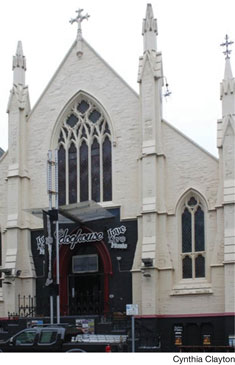 restaurants, and liquor stores. The
consequences of
rejecting Christianity are readily visible everywhere you go in
Scotland and Ireland. We took a tour of the countryside of Ireland
around Dublin, and our tour guide was a walking encyclopedia not only
of the history of Ireland, but of the current state of its people. “We
are a grumpy lot,” he said, and went on to ask us if we had met people
on the street who actually smiled. When someone said they had, his
response was “they must have been tourists, because we are not a happy
people.” We found people to be friendly and very helpful, but also
quite defensive and distant. Distrust was a constant reminder of the
pervasive mind-set of the people that all of life is a competition, and
only the fit survive.
restaurants, and liquor stores. The
consequences of
rejecting Christianity are readily visible everywhere you go in
Scotland and Ireland. We took a tour of the countryside of Ireland
around Dublin, and our tour guide was a walking encyclopedia not only
of the history of Ireland, but of the current state of its people. “We
are a grumpy lot,” he said, and went on to ask us if we had met people
on the street who actually smiled. When someone said they had, his
response was “they must have been tourists, because we are not a happy
people.” We found people to be friendly and very helpful, but also
quite defensive and distant. Distrust was a constant reminder of the
pervasive mind-set of the people that all of life is a competition, and
only the fit survive.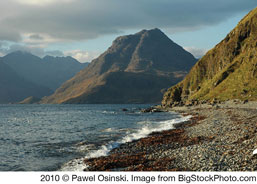 Our presentations were well attended in every place where
we gave them.
We found that people rejected out of hand anything that involved the
word “church.” The history of religious and church struggles has soured
most people to the point where they would not even consider something
connected to church in any other way than a historical way. By the same
token we found enormous interest in God and the evidence for God’s
existence. Getting people to understand that the church is people (1
Corinthians 3:16 ff.) and not a building was a major struggle. We
found
enormous interest in the question of what God is — that God is a Spirit
(John
4:24) and not an old man in the sky — and what that really means.
People had a skeptical view of the Bible, but most of their knowledge
was what they had heard the Bible says, not what the Bible actually
says. Discussing the Sermon on the Mount in Matthew
chapters 5 through
7 and the radical concepts of Christ piqued a great deal of
interest.
One night we had a long discussion of Matthew
5:38 – 48 in which Jesus
talks about turning the other cheek, going the second mile, and loving
your enemies. After this, one man said, “Well then all of this war that
has decimated our country was in contradiction to what Jesus taught?” I
jumped on that, of course, pointing out that the Crusades were also in
opposition to the teachings of Christ. He responded by saying he wanted
to know more about “this Jesus which I have never heard of.”
Our presentations were well attended in every place where
we gave them.
We found that people rejected out of hand anything that involved the
word “church.” The history of religious and church struggles has soured
most people to the point where they would not even consider something
connected to church in any other way than a historical way. By the same
token we found enormous interest in God and the evidence for God’s
existence. Getting people to understand that the church is people (1
Corinthians 3:16 ff.) and not a building was a major struggle. We
found
enormous interest in the question of what God is — that God is a Spirit
(John
4:24) and not an old man in the sky — and what that really means.
People had a skeptical view of the Bible, but most of their knowledge
was what they had heard the Bible says, not what the Bible actually
says. Discussing the Sermon on the Mount in Matthew
chapters 5 through
7 and the radical concepts of Christ piqued a great deal of
interest.
One night we had a long discussion of Matthew
5:38 – 48 in which Jesus
talks about turning the other cheek, going the second mile, and loving
your enemies. After this, one man said, “Well then all of this war that
has decimated our country was in contradiction to what Jesus taught?” I
jumped on that, of course, pointing out that the Crusades were also in
opposition to the teachings of Christ. He responded by saying he wanted
to know more about “this Jesus which I have never heard of.”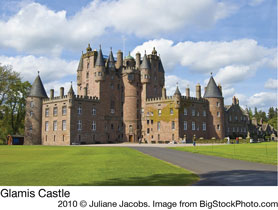 I have to think of what has happened in
the United States, and how that
is still unfolding. Christianity has been distorted by many in this
country, both in the past and today, to a political/militaristic
concept. We have people today who are urging churches to contribute to
military action in Israel to facilitate the return of Jesus to the
throne of David in Jerusalem. In the past we have had racism promoted
by pseudo-Christian groups such as the Ku Klux Klan. Christianity has
been used to fleece people of their savings to promote religious
causes, or to say to them that God will give them back more than they
give if they will turn their savings over to a Christian minister.
Religious scams are everywhere, even in things that appear to be
positive causes. Some relief money given to charities has been
embezzled by religious leaders, and immoral actions by religious
figures are commonplace. The result of all of this is a growing
distrust of religion, and a tendency to reject Christianity because it
is viewed as the tool that enables this bad activity.
I have to think of what has happened in
the United States, and how that
is still unfolding. Christianity has been distorted by many in this
country, both in the past and today, to a political/militaristic
concept. We have people today who are urging churches to contribute to
military action in Israel to facilitate the return of Jesus to the
throne of David in Jerusalem. In the past we have had racism promoted
by pseudo-Christian groups such as the Ku Klux Klan. Christianity has
been used to fleece people of their savings to promote religious
causes, or to say to them that God will give them back more than they
give if they will turn their savings over to a Christian minister.
Religious scams are everywhere, even in things that appear to be
positive causes. Some relief money given to charities has been
embezzled by religious leaders, and immoral actions by religious
figures are commonplace. The result of all of this is a growing
distrust of religion, and a tendency to reject Christianity because it
is viewed as the tool that enables this bad activity.Back to Contents Does God Exist?, JanFeb11.